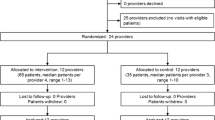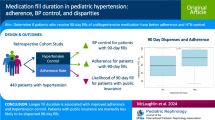Summary
Background
Studies showed a positive association between appointment adherence and blood pressure control. In randomized-controlled trials blood pressure therapy was improved by recall systems. We analyze the effectiveness of an active telephone recall on blood pressure control for patients with low appointment adherence in regular primary care.
Methods
This retrospective cohort study analyses all hypertensive patients without any hypertension-related disease (primary prevention) of an academic teaching primary care practice using a structured hypertension management. Blood pressure levels at the beginning of the hypertension management and after 1 year were analyzed. Blood pressure control rates (< 140/90 mmHg) and average blood pressure of patients with good appointment adherence and those requiring a phone recall were compared.
Results
A total of 410 hypertensive patients were identified. A telephone recall was required in 22 % (n = 92), which was successful in 87 % of patients (n = 80). At the beginning, 66 % of appointment adherent patients had controlled hypertension which increased to 81 % after 1 year. In patients not adhering to appointments the initial blood pressure control rate was 59 % and improved to 74 % after 1 year. Average blood pressure office readings decreased from 141/90 to 136/86 mmHg (p < 0.05) in those adhering to appointments, while it improved from 146/92 to 138/88 mmHg (p < 0.05) in those requiring recall.
Conclusions
Active telephone recall improved blood pressure control of hypertensive patients with low appointment adherence in regular primary care. An active recall can be recommended for other primary care scenarios.
Zusammenfassung
Grundlagen
Studien haben gezeigt, dass eine hohe Terminadhärenz die Blutdruckkontrollrate von Hypertonikern verbessert. Die vorliegende Analyse untersucht, wie sich terminadhärente Hypertoniker und Hypertoniker mit Recall-Notwendigkeit unterscheiden und ob ein aktiver Telefonrecall die Kontrollrate unter nicht-terminadhärenten Hypertonikern in der hausärztlichen Versorgung verbessert.
Methodik
In dieser retrospektiven Kohortenstudie wurden alle Hypertoniker ohne manifeste Folgeerkrankung (Primärprävention) einer akademischen Hausarztpraxis, die ein Hypertonie-Management pflegt, untersucht. Die Blutdruckmesswerte zu Beginn und ein Jahr nach der Einführung des Hypertonie-Managements wurden analysiert. Die Kontrollrate (Blutdruck ≤ 140/90 mmHg) von Terminadhärenten und Hypertonikern mit Recall-Notwendigkeit sowie die mittleren Blutdruckmesswerte beider Gruppen wurden verglichen. Die statistische Auswertung erfolgte mit SPSS.
Ergebnisse
Die Studienpopulation umfasste 410 Hypertoniker, von denen 78 % terminadhärent waren (n = 318) und 22 % einen Recall benötigten (n = 92). Bei 87 % von diesen war der Recall erfolgreich (n = 80). Die Blutdruckkontrollrate betrug zu Beginn bei Terminadhärenten 66 %, bei Patienten mit Recall-Notwendigkeit 59 %. Nach einem Jahr waren dies 81 % bzw. 74 %. Bei Praxisblutdruckmessungen betrug der mittlere Blutdruck 141/90 mmHg (Terminadhärenz) bzw. 146/92 mmHg (Recall), nach einem Jahr war dies 136/86 bzw. 138/88 mmHg (p < 0,05).
Schlussfolgerungen
Durch einen aktiven Telefonrecall konnte insbesondere die Blutdruckeinstellung von nicht-terminadhärenten Hypertonikern signifikant verbessert werden. Ein aktiver Recall kann auch für andere (hausärztliche) Szenarien empfohlen werden.


Similar content being viewed by others
References
Morisky DE, Levine DM, Green LW, Shapiro S, Russell RP, Smith CR. Five-year blood pressure control and mortality following health education for hypertensive patients. Am J Public Health. 1983;73(2):153–62.
Chowdhury R, Khan H, Heydon E, et al. Adherence to cardiovascular therapy: a meta-analysis of prevalence and clinical consequences. Eur Heart J. 2013;34(38):2940–8.
Naderi SH, Bestwick JP, Wald DS. Adherence to drugs that prevent cardiovascular disease: meta-analysis on 376,162 patients. Am J Med. 2012;125(9):882–7.
Dosse C, Cesarino CB, Martin JF, Castedo MC. Factors associated to patients’ noncompliance with hypertension treatment. Rev Lat Am Enfermagem. 2009;17(2):201–6.
Coelho EB, Moysés Neto M, Palhares R, Cardoso MC, Geleilete TJ, Nobre F. Relationship between regular attendance to ambulatory appointments and blood pressure control among hypertensive patients. Arq Bras Cardiol. 2005;85(3):157–61.
Glynn LG, Murphy AW, Smith SM, Schroeder K, Fahey T. Interventions used to improve control of blood pressure in patients with hypertension. Cochrane Database Syst Rev. 2010;(3):CD005182.
Hypertension Detection and Follow-up Program Cooperative Group. Five-year findings of the hypertension detection and follow-up program. I. Reduction in mortality of persons with high blood pressure, including mild hypertension. Hypertension detection and follow-up program cooperative group. JAMA. 1979;242(23):2562–71.
Weltermann B, Schlomann H, Mousa Doost S, Gesenhues S. Hypertension management program improves blood pressure control in primary care. Circulation. 2009;120:438.
Kuulasmaa K, Hense H, Tolonen H. Quality assessment of data on blood pressure in the WHO MONICA project. WHO MONICA project e-publications, No. 9; 1998.
Mancia G, Fagard R, Narkiewicz K, et al. 2013 ESH/ESC guidelines for the management of arterial hypertension: the task force for the management of arterial hypertension of the European Society of Hypertension (ESH) and of the European Society of Cardiology (ESC). Eur Heart J. 2013;34(28):2159–219.
Mancia G, Backer G de, Dominiczak A, et al. 2007 ESH-ESC practice guidelines for the management of arterial hypertension: ESH-ESC task force on the management of arterial hypertension. J Hypertens. 2007;25(9):1751–62.
Wortberg S, Walter D. Recallsystems in primary care practices to increase vaccination rates against seasonal influenza. Dtsch Med Wochenschr. 2010;135(22):1113–7.
Fortuna RJ, Idris A, Winters P, et al. Get screened: a randomized trial of the incremental benefits of reminders, recall, and outreach on cancer screening. J Gen Intern Med. 2014;29(1):90–7.
Conflict of interest
All authors declare that they do not have any conflict of interest.
Author information
Authors and Affiliations
Corresponding author
Rights and permissions
About this article
Cite this article
Weltermann, B. ., Doost, S., Kersting, C. et al. Hypertension management in primary care: how effective is a telephone recall for patients with low appointment adherence in a practice setting?. Wien Klin Wochenschr 126, 613–618 (2014). https://doi.org/10.1007/s00508-014-0590-9
Received:
Accepted:
Published:
Issue Date:
DOI: https://doi.org/10.1007/s00508-014-0590-9
Keywords
- Appointment adherence
- Telephone recall
- Blood pressure control
- Hypertension management
- Primary prevention




